 Building homes in factories using modular techniques have multiple benefits, not least that manufacturing of housing can be located in places where there is a need for employment. This also means workers have a fixed place of work with a consistent demand.
Building homes in factories using modular techniques have multiple benefits, not least that manufacturing of housing can be located in places where there is a need for employment. This also means workers have a fixed place of work with a consistent demand.
Faster – Quicker delivery
The Modules and pods can be installed on site in a matter of days for smaller homes and a few weeks for a larger house or a block of flats, the upside is obvious, but I also highlight the number of lost working days with traditional building methods due to bad weather – this is not an issue with offsite modular construction particularly as the modules are normally weatherproof on delivery.
As buildings are constructed inside factories, they are not impacted by delays caused by bad weather, bad light or theft.
Better – Higher Quality
As the modules that make up our buildings, and the fitting-out of them, is completed inside a factory the quality can be monitored more easily and quality control maintained.
Also, as we would only use quality materials to build our modular building units we can achieve millimetre accuracy in the construction and fitting out. This accuracy is maintained through the life of the building making it much more efficient throughout its lifespan.
Cheaper - Lower prices
Mass production of standardised modular units and pods which are assembled on a production line basis will drastically reduce the overall cost, the reduced time for workmen to be on the building site is also a hidden cost benefit along with a reduction in theft of materials and equipment which is identified as a significant cost with traditional building methods.
Greener - Ecological & sustainable
As mentioned before, we can employ the best recyclable materials and finishes which will be mounted on modular frames. These materials offer the best thermal resistance in both the heat and cold making the resulting home much better and efficient to live in.
Centralised manufacturing methods also reduce transport movements of both materials and personnel.
Better water management
Due to the flexibility of design, we are easily able to collect rainwater and run it into a grey water management system which can be used to flush toilets etc. reducing the demand on the main water supply which in turn reduces costs to the homeowner.
Efficient use of utilities
Overall, the above benefits will reduce the use of heating & cooling within the home, it will allow easier maintenance of the ideal ambient temperature. We can also add elements of solar power generation to reduce the reliance on external power sources.
Standardisation
The modules are built with special module measurements with a frame that will withstand shipping and strength requirements, manufacturing takes place in the factory using production line efficiency methods.
Structural integrity
The modules can be designed to build up to 6 floors of accommodation without additional structural support being required.
Design Flexibility
There is ample opportunity for different styles and configurations of housing, due to the modular elements you have a greater variety of optional layouts and finishes that are quickly implemented.
Environmentally Friendly
Environmentally friendly production as the materials and modules can be recycled after use and reused.
Efficient Energy Solutions
Modular housing can be well insulated using the most up to date efficient materials that are constantly reviewed. We can easily incorporate the very latest ecologically beneficial facilities such as solar power generation and grey water management, all installed in the comfort of our factories.
Fulfils Building Permission Requirements
The modules can built according to national and local planning regulations resulting in efficiencies from standardisations and shorter time to gain building permissions.




